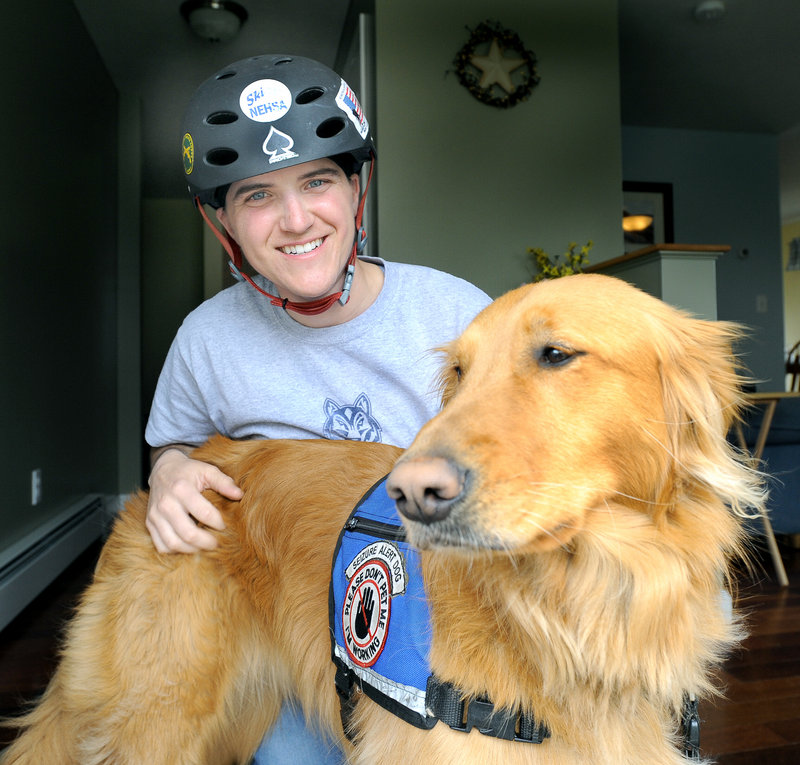Christy Gardner, who was a driven athlete at Edward Little High School in Auburn and at Long Island College in New York, found basic training at Fort Leonard Wood a breeze.
She cruised through military police training before being deployed to the demilitarized zone between North Korea and South Korea.
But she suffered a traumatic brain injury during police operations there, and even the most basic tasks became challenging, even dangerous. “My medical records said I was not allowed to bathe alone, in case I had a seizure,” said Gardner, 28.
With brain damage that makes her prone to terrible seizures, Gardner lays credits for her ability to live alone squarely at the four furry feet of her golden retriever, Moxie.
Moxie, a service dog, can sense her owner’s grand mal seizures 10 minutes before they hit, and warn her to sit on the ground so she doesn’t injure herself falling.
Moxie can pull blankets off Gardner so she doesn’t choke during a seizure in bed, and is trained to roll her on her side and dial 911 on a special, large-button cell phone. She even can open the door, run to a neighbor’s home and ring the doorbell for help in an emergency.
So Gardner was startled when she entered a Portland convenience store last summer to get Moxie some water and the owner ordered them to leave, then walked toward them, his hands outstretched, to herd them from the store.
Gardner was frightened, mostly for Moxie. “If something happened to her physically, I have to find a live-in nurse or I have to live in a (nursing) home,” Gardner said.
She flagged down Portland police officer Nicholas Goodman. After consulting with the Attorney General’s Office, Goodman issued Peter Brichetto Jr., the owner of Sonny’s Variety at Congress and Valley streets, a court summons charging him with denial of public accommodation. The misdemeanor is punishable by as much as six months in jail and a fine of $1,000.
Gardner contacted her friend Kelly Hoffman, an attorney with Norman Hanson & DeTroy. Together, they filed a complaint with the Maine Human Rights Commission.
“An apology isn’t enough. … It’s more about other people learning,” Hoffman said.
The criminal charge was dismissed as part of an agreement that called for Brichetto to post a sign in his store window reading “Notice: Service Dogs Welcome.”
The civil case was settled for $13,500. The money can help Gardner cover expenses that aren’t covered by the Veterans Administration, including the high-tech helmet she must wear to protect her skull if she collapses.
The circumstances of her service injury are confidential because of the tense political climate on the Korean peninsula, she said.
Some time afterward, she had her first seizure and fell head first into a coffee table, breaking her jaw and cheekbone and re-injuring her skull. That’s when doctors said she could not live alone.
After a year of active-duty rehabilitation, she was medically retired in December 2007 and moved in with her parents.
“I went from being so independent — I had my own car, I had a good job,” she said.
Gardner learned that a service dog could help her, but there was a five-year wait, at least. Then, Susquehanna Service Dogs in Pennsylvania agreed to help her train a dog for her disability, even though it usually trains dogs to assist people who have visual or mobility handicaps.
Gardner got Moxie as a puppy in the summer of 2007, and after countless hours of repetition, came to rely on the dog to keep her safe. That kind of expertise doesn’t come cheap. Moxie cost $18,000.
They live in a new subdivision in Lewiston, the walls the small Cape decorated with photographs of Acadia taken by Gardner, who was a photojournalism major in college and worked part time for Newsday.
Gardner said she’s not sure how Moxie can sense the oncoming seizures, but she has missed only one and had one false alert.
“We sat on the floor in Walmart for 20 minutes,” waiting for a seizure that never came, she said.
Moxie is on duty 24 hour a day, seven days a week. In fact, whenever Gardner is out of sight, Moxie suffers from anxiety, shaking nervously.
Once, Gardner had boarded a flight and had to use the bathroom. The flight attendant agreed to watch Moxie. When the back of the plane opened for a load of food, Moxie shot out the back and started scouring the truck for Gardner.
Moxie has reopened the world to Gardner. She can’t drive, but she can take the Greyhound bus from Lewiston to Portland, to take classes in athletic training at the University of Southern Maine.
After class on a blistering hot September day, as she prepared to board the bus for home, she sought water for Moxie in Sonny’s Variety.
“Basically, the guy got really mad that I was in there. He said, ‘I don’t allow dogs in the store,”‘ she said.
Although it’s not required for a service dog, Moxie was leashed and was wearing a blue vest.
“I said, ‘She’s not a pet, she’s a service dog. She’s required to be with me at all times,’ ” Gardner recounted. “He said: ‘I don’t care at all.”‘
Federal law requires store owners to accommodate service animals. They animals don’t have to be registered, but they must be necessary to help overcome a federally recognized disability.
The officer issued Brichetto the summons and got some water for Moxie. That night, Gardner had a seizure.
The civil case was settled last month.
Brichetto, accompanied by his lawyer, William Childs, said Wednesday that he didn’t realize Moxie was a genuine service dog and thought Gardner’s helmet indicated she had ridden there on a bicycle.
He said his store is in a tough section of town and he typically ordered people with dogs to leave.
Not anymore.
Brichetto said he didn’t understand that a service dog could be something other than a seeing eye dog, and he now respects the abilities of dogs like Moxie.
“It’s amazing they can do that,” he said. “I feel bad. This lady fought for our country and I’m throwing her out. … I made a mistake and it was a costly mistake,” he said.
Staff Writer David Hench can be contacted at 791-6327 or at:
dhench@pressherald.com
Copy the Story Link
Send questions/comments to the editors.




Success. Please wait for the page to reload. If the page does not reload within 5 seconds, please refresh the page.
Enter your email and password to access comments.
Hi, to comment on stories you must . This profile is in addition to your subscription and website login.
Already have a commenting profile? .
Invalid username/password.
Please check your email to confirm and complete your registration.
Only subscribers are eligible to post comments. Please subscribe or login first for digital access. Here’s why.
Use the form below to reset your password. When you've submitted your account email, we will send an email with a reset code.